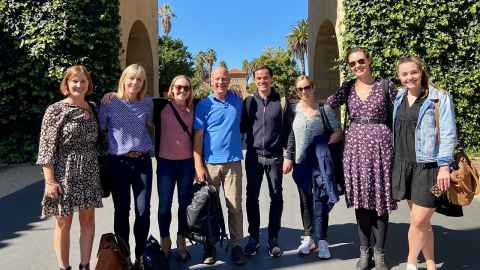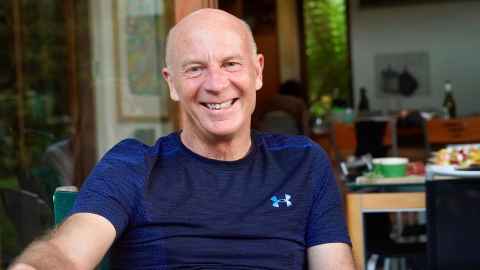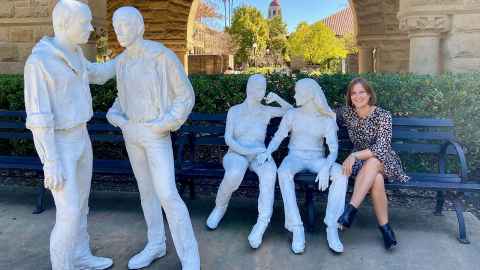Psychology professor and students time it right for Stanford University trip
5 May 2020
Professor Keith Petrie and a group of students from the Faculty of Medical and Health Sciences recently visited Stanford University, just in the nick of time.

Professor Keith Petrie, a psychologist in the Faculty of Medical and Health Sciences, has done a lot of research over the years on the subject of compliance.
That compliance relates to people with an illness and how well they follow their doctor’s guidance on taking their medication. So would the kind of psyche that doesn’t follow a doctor’s instructions be the same kind that didn’t stick to lockdown?
“It’s a different sort of health behaviour,” says Keith. “For people to adhere to lockdown, they had to see themselves as personally vulnerable or know people personally who are vulnerable.
“People could see from the statistics in other countries that Covid-19 is a very contagious virus. If people see positive benefits from their behaviour, they’re more likely to continue it and that increased people’s acceptance of the lockdown.”
Keith is also known internationally for his work on placebo and nocebo processes. The placebo effect is well known; the nocebo effect less so. It’s when people report negative side effects after hearing other people report the same negative side effects, for example after a change in their drug to a generic form.
“The nocebo effect is essentially a self-fulfilling prophecy. If you have negative expectations, either you’ll think you have those side effects or will look for those side effects.”

If you have negative expectations, either you’ll think you have those side effects or you will look for those side effects.
In February, Keith took Auckland student researchers to Stanford University as part of collaborative research with its psychology department, some of which relates to the nocebo effect.
“Assistant Professor Alia Crum is a principal investigator in the Mind & Body Lab at Stanford,” says Keith. “Her research also focuses on how changes in our mindsets can alter our objective reality. For example, if you believe stress has a negative effect on health, that seems to have a worse outcome than if you believe stress can be a positive thing. Her work on mindsets overlaps my work on placebo and nocebo processes so we’d decided to align some of our research projects. We also have graduate students who are collaborating on research projects together.”
The University of Auckland group arrived home from their ten-day Stanford visit not long before things turned ugly with Covid-19.
“We were just ahead of when San Francisco went into lockdown,” says Keith. “A few of us had gone to a conference in New Orleans after Stanford and that was just after Mardi Gras. Many of the New Orleans problems came from Mardi Gras because there are about a million people going into New Orleans at one time.”

After presenting my research at Stanford, they’re now actually using the symptom scale for a study they’re conducting to investigate people’s perceptions of Covid-19.
One of those who spent time at Stanford was doctoral student Kate MacKrill, whose thesis is on the nocebo effect. Kate had won a 2020 Bagnall Doctoral Student International Mobility Scholarship.
“The trip was an amazing opportunity and a highlight of my PhD,” says Kate. “Our labs do quite similar research, so we had fruitful discussions that sparked new ideas. Having met at a conference last year, it was great to get to know the Stanford researchers better and gain some new collaborators for future research projects.”
Keith says the students gained knowledge and motivation from the trip. “They found it pretty inspiring to be in that environment and also to see how the research we do here is well regarded.”
He says they also ‘got a kick out of’ being at the site of one of Stanford’s controversial experiments in the 1970s.
“It’s a top psychology department and has a lovely campus. It’s also where the Stanford Prison Experiment was conducted in a famous study by Philip Zimbardo. He assigned students to live in the basement of the psychology department – some were ‘prisoners’ and some were ‘jailers’.”
Irony then, that they should return home to find themselves locked down shortly after.
“At least we could get outside for a walk, which has been the best thing you can do for mental health. There have been pluses and minuses – people have had more time to exercise.”
Kate says one aspect of her research turned out to be timely. “My PhD study investigated the effect of symptom tracking apps on symptom reporting. We had developed a new scale that measures people’s beliefs about the cause of symptoms.
“After presenting the research at Stanford, they’re now actually using the symptom scale for a study they’re conducting to investigate people’s perceptions of Covid-19.”
Kate was due to attend an event in London as part of her Scholarship.
“Ironically I was meant to be attending a meeting on health scares and had been accepted to present at the International Congress of Behavioural Medicine in Glasgow. They’ve been postponed until 2021.”
Keith says research has had to change focus.
“Data-gathering has paused, but there are always papers to write up on new studies and people to meet on Zoom. It’s a good chance to get all those papers finished that you had lying around.”
– Denise Montgomery
This story first appeared in the May 2020 edition of the University of Auckland's UniNews magazine.